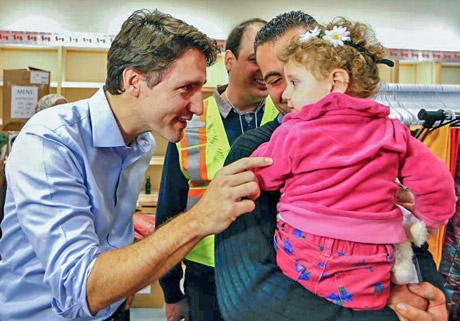by U.S. - PM

Toronto – Canadian Prime Minister Justin Trudeau has a message for refugees rejected by U.S. President Donald Trump: Canada will take you.
He also intends to talk to Trump about the success of Canada’s refugee policy.
Trudeau reacted to Trump’s ban of Muslims from certain countries by tweeting Saturday: “To those fleeing persecution, terror & war, Canadians will welcome you, regardless of your faith. Diversity is our strength #WelcomeToCanada.”
Trudeau also posted a picture of him greeting a Syrian child at Toronto’s airport in late 2015. The Prime Minister oversaw the arrival of more than 39,000 Syrian refugees soon after he was elected.
A spokeswoman for the Prime Minister said Trudeau has a message for Trump.
“The Prime Minister is looking forward to discussing the successes of Canada’s immigration and refugee policy with the President when they next speak,” Trudeau spokeswoman Kate Purchase told The Associated Press.
Trudeau is expected to the visit the White House soon.
The Prime Minister has refrained from criticizing Trump to avoid offending the new president. More than 75 percent of Canada’s exports go to the U.S.
Toronto Mayor John Tory also weighed in, noting that the city is the most diverse in the world.
“We understand that as Canadians we are almost all immigrants, and that no one should be excluded on the basis of their ethnicity or nationality,” Tory said in a statement.
Trump signed a sweeping executive order Friday that he billed as a necessary step to stop “radical Islamic terrorists” from coming to the U.S. Included is a 90-day ban on travel to the U.S. by citizens of Iraq, Syria, Iran, Sudan, Libya, Somalia or Yemen and a 120-day suspension of the U.S. refugee program.
Trump’s order singled out Syrians for the most aggressive ban, ordering that anyone from that country, including those fleeing civil war, are indefinitely blocked from coming to the United States.
Trump, who successfully tapped into American fears about terror attacks during his campaign, had promised what he called “extreme vetting” of immigrants and refugees from areas the White House said the U.S. Congress deemed to be high risk. He told reporters in the Oval Office on Saturday that his order was “not a Muslim ban” and that measures were long overdue.
Democratic attorneys general across the US on Sunday condemned the President’s order to restrict people from seven Muslim-majority countries from entering the country and are discussing whether to challenge the administration in court.
The Syrian refugee crisis became a major issue in Canada’s election in late 2015 because of the haunting image of a drowned 3-year-old Syrian boy washed up on a Turkish beach. The boy had relatives in Canada.
Trudeau’s tweet quickly received more than 150,000 likes. “Welcome to Canada” trended in Canada.
The Canada Summer Jobs program makes it easier to hire students during the summer by providing up to 50 percent of the minimum hourly wage for small businesses and public sector employers, and up to 100 percent for not-for-profits, plus employment-related costs. Students can start working as early as April.
“I invite all employers who haven’t yet done so to apply today to receive support to hire students this summer. This is a tremendous opportunity to offer work experience to energetic, enthusiastic students, and to keep our economy growing,” said the Honourable Patty Hajdu, Canada’s newly appointed minister of Employment, Workforce Development and Labour.
Canada Summer Jobs creates thousands of summer work opportunities every year for students age 15 to 30.
The program focuses on local and national priorities, including:
• creating new jobs to make small businesses more innovative, competitive and successful;
• welcoming and settling immigrants (including Syrian refugees) in Canada;
• hiring Indigenous people;
• supporting opportunities in science, technology, engineering and mathematics sectors;
• increasing opportunities in information and communications technology sectors; and
• celebrating Canada’s 150th anniversary of Confederation.
Employers looking to hire a student have until February 3, to submit their application.
For more information and to apply, visit Canada.ca/Canada-summer-jobs or visit a Service Canada Centre.


